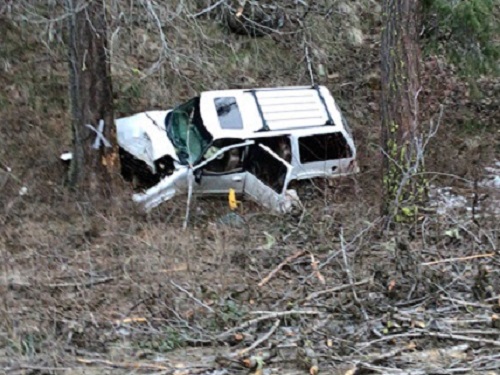Workers for the Washington State Department of Transportation and Idaho Transportation Department recently went beyond the call of duty to help save the lives a car crash victim and an injured hiker, respectively.
[Above photo by WSDOT]
In early March, WSDOT Maintenance Work Jerry Bennett was on a routine patrol on State Route 410 a few miles west of Whistlin’ Jack Lodge near Chinook Pass when he spotted some fallen trees.

After pushing the fallen trees off the road and onto the shoulder using the plow on his truck, Bennett hopped out to toss the remaining debris safely away from the road. That is when he noticed a car buried in the forest off the highway and then heard a woman yelling for help.
Bennett climbed down the hill and found the female motorist wet, cold, and with some minor injuries. She had missed her turn in the night for US 12 – continuing onto SR 410, which was closed due to heavy snow and avalanche danger. She lost control of her vehicle crashed, and with no cell phone service in this remote area, found herself stranded overnight hoping someone might drive by.
Bennett escorted the woman safely to his truck, turned up the heater, and radioed for help. Medical aid soon arrived along with a Washington State Patrol officer who helped Bennett check the area to make sure there were no other passengers around the vehicle. Medical personnel said Bennett’s actions most likely saved that woman’s life.

Previously, in late February, three Idaho Transportation Department workers based in the remote Powell ITD shed along US 12 in north-central Idaho in the heart of the Clearwater/Bitterroot National Forest overheard an emergency radio call regarding a hiker in distress.
The hiker had taken a serious fall during her visit to Weir Creek Hot Springs, sustaining major injuries while tumbling down a 200-foot embankment off the edge of the trail and into the creek. Unable to move, the hiker’s companions pulled her from the freezing water to the nearby rocky bank while radioing for help.

ITD District 2 employees Bill Foust and Casey Zeimantz were the first to arrive on scene, followed by fellow ITD worker Mitch Miller.
Foust assisted the injured hiker by keeping her spirits up and performing a basic medical assessment to determine if she could be moved.
“It was difficult to assess because she had been partially submerged for so long,” he explained. “She was extremely cold and hypothermic.”
The three ITD workers were later joined by Idaho State Police Trooper David Wesche, three U.S. Forest Service personnel, Lowell’s Quick Response Team, an Idaho County Sheriff deputy, and eventually a local ambulance crew from the nearby town of Kooskia.
Indications were pointing to something broken, like a possible neck or back injury. Caution dictated that the hike shouldn’t be moved without advanced medical care and proper immobilization techniques.
The medical team from Kooskia and got her situated on a backboard. “We placed heat packs around her and wrapped her up in thermal space blankets,” ITD’s Foust noted. “She couldn’t feel the heat which started to make us nervous.”
Next, a qualified rope team secured the injured hiker for portage back up to the trail. Foust estimated that it “took 12 or 13 of us to hoist her out of there inch by inch and with excellent teamwork.”
She was extracted at around 4:30 a.m. and sent to Missoula, MT, for advanced care. Though her prognosis was “grim” at the time, the quick rescue stabilized the hiker and she successfully recovered from her injuries.
 States
States


